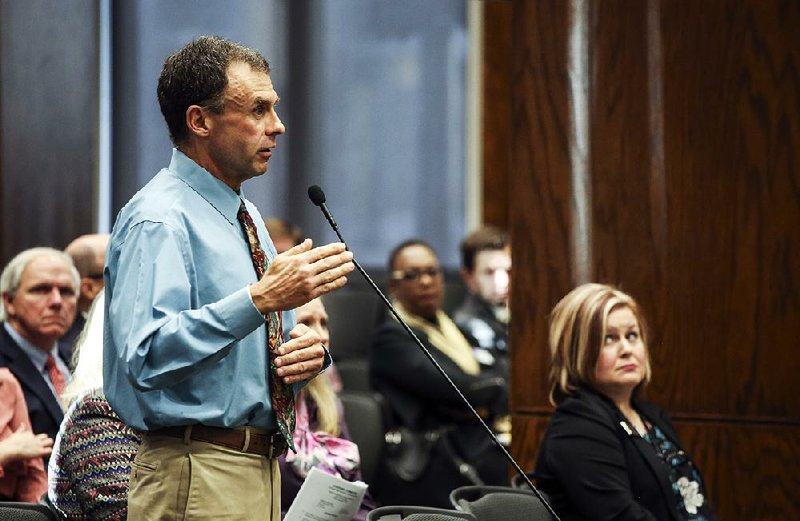Henderson State University wants to offer two doctoral degrees -- one in nursing practice and another in instructional leadership -- by fall 2019.
The Arkadelphia university is the second public four-year school in the past six months to start the process to offer its first-ever degrees above the master's level. Southern Arkansas University in Magnolia started the same process in October for a doctor of education in rural and diverse leadership.
The yearslong processes start with requests for a "role and scope" change, so the schools can teach the highest-level courses. Once that is granted, the schools will then seek approvals for the actual degree programs.
Steve Adkison, Henderson provost and vice president for academic affairs, referred to both programs as adding to the "ladder of opportunity" for both teachers and nurses.
"Those degree programs build on existing program offerings," he said, "and are in direct response to the need of community partners in our region of south and southwest Arkansas."
Both degrees would be offered online only.
The doctor of education in instructional leadership builds on post-master's certifications that the university currently offers: two education specialist pathways in curriculum leadership and educational leadership. Those programs are typically half the hours of a full doctoral degree, Adkison said.
The University of Arkansas at Little Rock and Texas A&M University Texarkana already have similar programs, while SAU is in the midst of the role-and-scope change. But Henderson's program "differs from others because it is designed specifically for instructional leadership with an emphasis on improved teaching and learning," according to the proposal the university submitted to the state Higher Education Department.
Henderson is in a long-standing consortium called Partners in Education that includes each public school superintendent in the region. Most have either a master's degree or the education specialist credential, Adkison said.
The doctor of nursing does not currently build on another degree, but the university is also looking to add a master of science in nursing to do so. If approved, Henderson will be the first university south of Little Rock to have the degree program and will be among the University of Central Arkansas, Arkansas State University, the University of Arkansas for Medical Sciences and the University of Arkansas, Fayetteville.
The nursing program blends in well with the partnership Henderson formed with National Park College in Hot Springs and CHI St. Vincent in Hot Springs to increase the number of nurses in the region. The hospital system has committed to giving both schools funding and to help some of the nursing students at both institutions through financial aid packages.
National Park has said it wants to double the current 60 students who are graduating annually as registered nurses, and Henderson is already providing online and traditional degree options for registered nurses to earn their bachelor of science in nursing.
The university is planning on adding the master's in nursing -- which is required at some hospitals for higher-level leadership positions -- and the doctorate, necessary for teaching master's and doctoral level nursing courses and for top-level positions at some hospitals, said Tony Houston, the president of CHI St. Vincent Hot Springs.
Houston added that Henderson taking such interest in the nursing profession tells the community a lot.
"These aren't easy programs to start," he said. "[What] it's telling the state and this region is that any nurse who is interested in advancing their knowledge, advancing their skill and getting degrees to advance their career, can do that from home. It's a big deal to know that we have a nursing school that is willing to invest because everyone benefits from that. When you have doctoral students interacting with master's students interacting with bachelor's students, it elevates the whole spectrum."
He added that, on the doctoral side, there's also research that helps grow the profession.
On Friday, Adkison introduced the 3,341-student university's intent to pursue the role and scope change to the state's Higher Education Coordinating Board.
"I would like to begin by making it clear that Henderson is not moving away from our role and mission as a teaching institution," he told the 11-member panel. "These two doctoral degrees are actually extensions of existing degrees that we're working on."
The proposal garnered little discussion among board members.
Vice Chairman Jim Carr asked why the university decided to pursue a doctor of education instead of a doctor in philosophy. The doctor of education not only builds on the education specialist credential, Adkison said, but has more of a focus on application rather than research.
Now, the university will hire three out-of-state consultants -- who are chosen by the Arkansas Higher Education Department -- to perform what Adkison called an "attenuated version of an accreditation visit." The consultants already practice in each of the fields and will review whether the university has the resources necessary to start up the highest-level degree programs.
After that, the consultants will report back to the department. If given the green light, Henderson would then need approval from the coordinating board on the academic program. It will also need approval from its accrediting agency, the Higher Learning Commission, on both the academic program and the role and scope change.
Adkison said the proposed degree programs would increase access and flexibility to working professionals and that university officials had taken into account the needs of both programs in determining size for each program.
"These will be fairly focused, but having said that, the need is basically boundless for the foreseeable future across the state of Arkansas," he said. "We're after the highest common denominator based on professional standards and best practice and not the lowest common denominator of volume."
Metro on 01/29/2018
